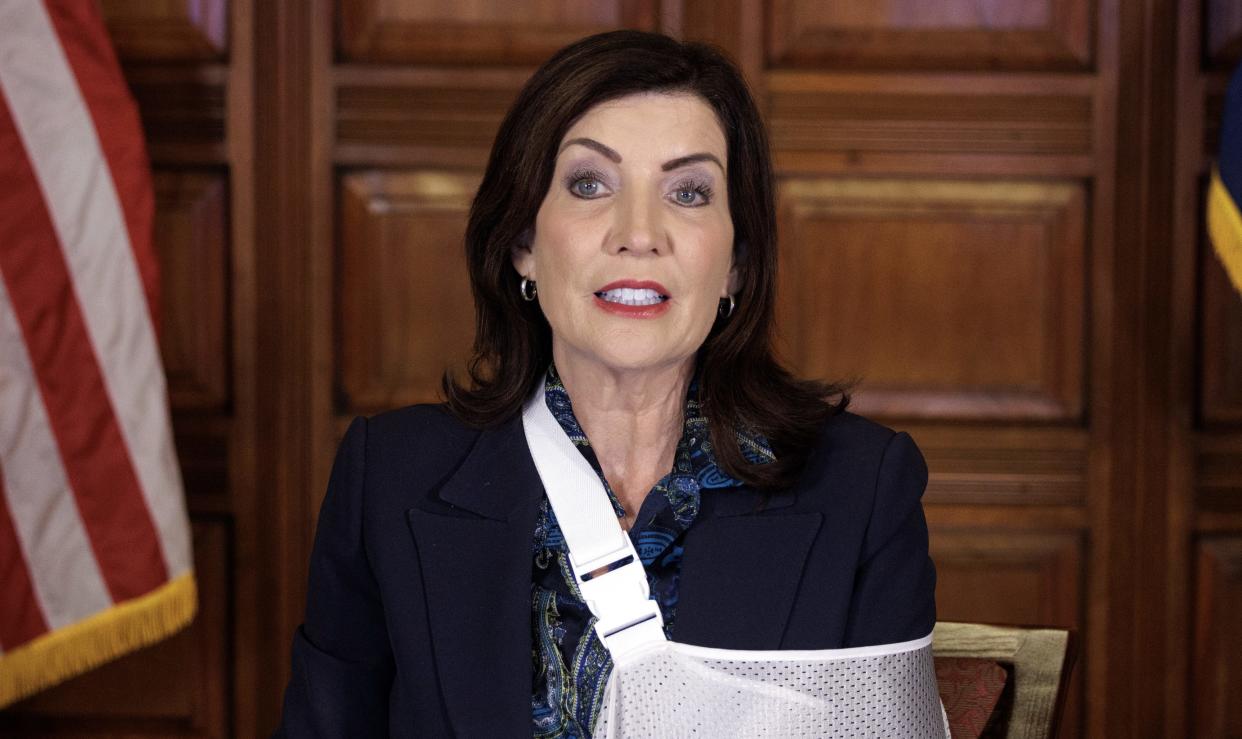New York Gov. Hochul’s State of the State address centers on public safety, mental health and affordability

- Oops!Something went wrong.Please try again later.
- Oops!Something went wrong.Please try again later.
ALBANY, N.Y. — Gov. Kathy Hochul on Tuesday trumpeted her agenda for the new year, outlining proposals aimed at overcoming post-pandemic mental health challenges, cracking down on retail thefts and illegal weed stores, and addressing the state’s urgent affordability crisis.
Speaking from the Assembly Chambers in her third State of the State address, Hochul declared that New York is less dangerous and more affordable than it was when she took office in the summer of 2021. But she acknowledged many New Yorkers remain fearful about crime rates that climbed during COVID, and feel crushed by “obscenely high” housing costs.
“If government can’t keep our citizens safe, then nothing else matters,” said Hochul, proudly detailing falling rates of violent crime, but describing an “atmosphere of anxiety” that continues to touch many New Yorkers.
The address amounts to a statement of principles and priorities to guide the governor as she releases a fleshed-out state budget proposal next week and engages in talks with lawmakers over the coming months.
Though the speech was packed with policy proposals, it lacked the ambition of her agenda last year, which included a bold housing proposal that fell apart in budget negotiations.
Crime-fighting proposals
On crime, Hochul, a centrist Democrat, outlined a proposed $20 million outlay to battle domestic violence, and an effort to zero in on retail theft with a new State Police squad and tougher penalties.
And Hochul also outlined a plan to empower the city to battle illegal cannabis shops — a big ask from her ally Mayor Eric Adams.
She framed improved mental health services as a central component of her public safety agenda, saying that funding for support systems has failed to grow sufficiently. Last year, Hochul included $1 billion in funding for mental health in her finalized budget. But she suggested the state has a ways to go.
Her 2024 blueprint includes plans to establish new mental health courts and to launch a coordination team at the state Mental Health Office.
“We have such a serious problem on our hands,” the governor said of mental health. “Make no mistake — this is the defining challenge of our time.”
A 2024 agenda
The plans — some of which she announced last week in a series of daily news conferences — come as New York works to turn back outmigration that has been blamed on housing shortages and a sky-high cost of living. In New York City, 50% of households lack sufficient pay to cover the cost of living, according to an April report published by the nonprofit United Way of New York City.
On housing, a closely watched issue, Hochul on Tuesday proposed a $500 million fund to support converting state facilities into as many as 15,000 homes, and new protections for low-income New Yorkers who use a Section 8 housing voucher. For now, she has shelved an ambitious plan to compel communities to build housing that met stiff suburban resistance last year.
She nodded to a looming $4 billion projected budget deficit next year, saying that she “won’t spend money we don’t have.”
“Every state relied upon pandemic funds from Washington that have dried up, and it’s on us, as responsible adults, to make the hard yet necessary decisions to use taxpayer dollars creatively and responsibly,” Hochul wrote in a foreword to her book of proposals.
Plans for New York City
The agenda carries a series of proposals that are squarely focused on New York City.
They include a $7.5 billion plan to extend the Second Avenue Subway by three stops along 125th Street, including a terminus at Broadway; a blueprint to build new pools with one potentially in the East River by the Brooklyn Bridge; and a ban on uncertified lithium-ion-powered e-bikes that have been blamed for ferocious fires in the five boroughs.
Hochul also took aim at maternal mortality challenges in city hospitals with a plan to bolster a statewide paid family leave program by including 40 hours of additional leave for mothers to pursue prenatal care.
And she reserved a section of her policy book to offer her support for a long-stalled legislative effort to allow New York City to lower its speed limits.
Little on migrants
She spent little time in her State of the State book addressing the state’s budgetary support for the city’s worsening migrant crisis. Hochul has previously pledged a nearly $2 billion state commitment to the city in the current budget, and has suggested she intends to supply at least $1 billion more in the next budget.
She said she would address the asylum-seeker crisis when she introduces her budget plan next week.
Adams has pushed the state for more help. He attended the speech for the second straight year.
Speaking to reporters after the speech, Adams said the state’s support on migrants is “the most important thing” for the city in the governor’s budget proposal. But he said he is on the same page with Hochul, and that his budget office is in talks with the governor’s office about its financial requests.
“She has been a partner,” Adams said of Hochul. “I’m not disappointed: She acknowledged the fact that she’s going to be talking about the asylum issue in her budgetary address.”
_____
(With Michael Gartland and Téa Kvetenadze.)
_____

